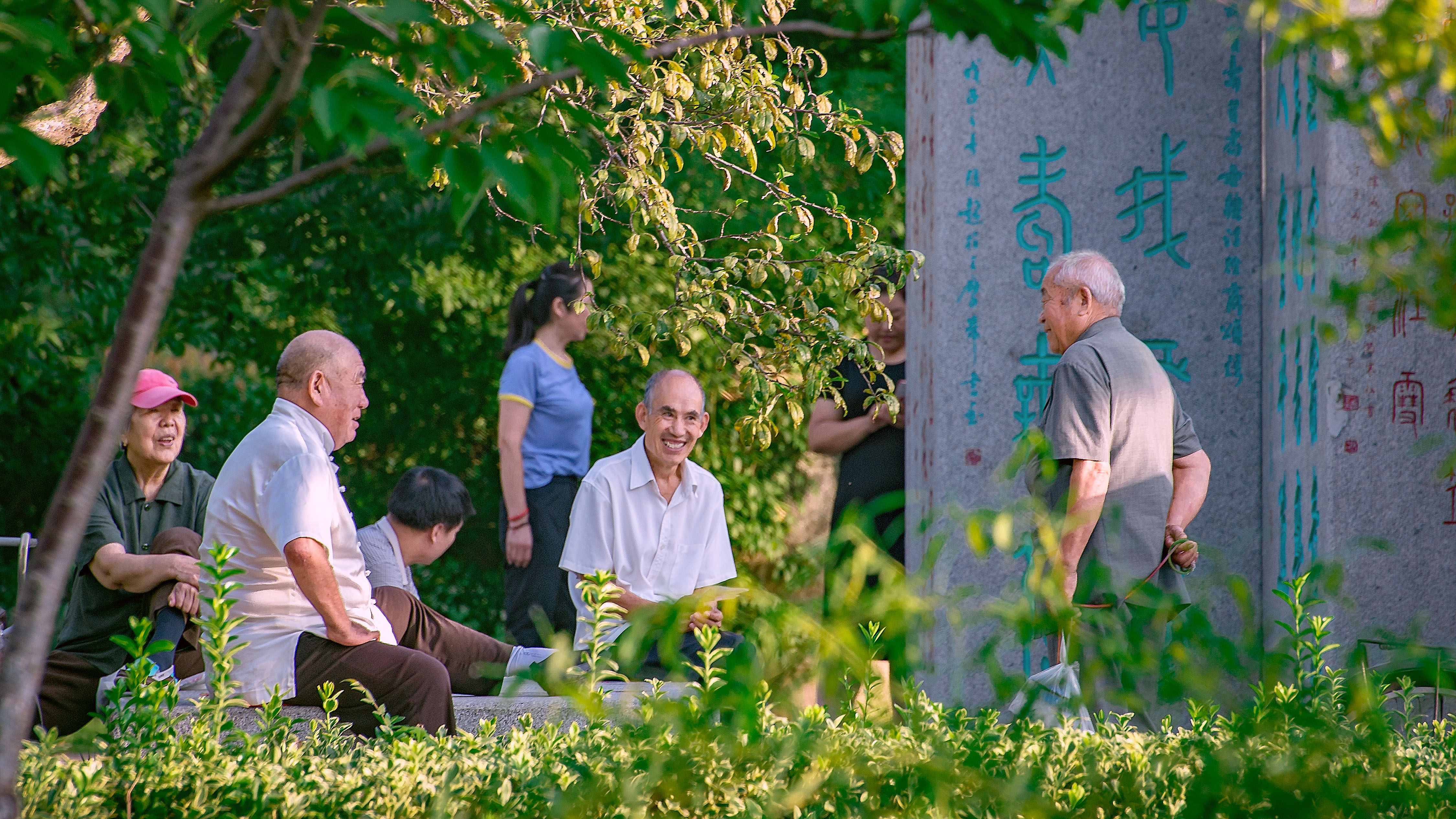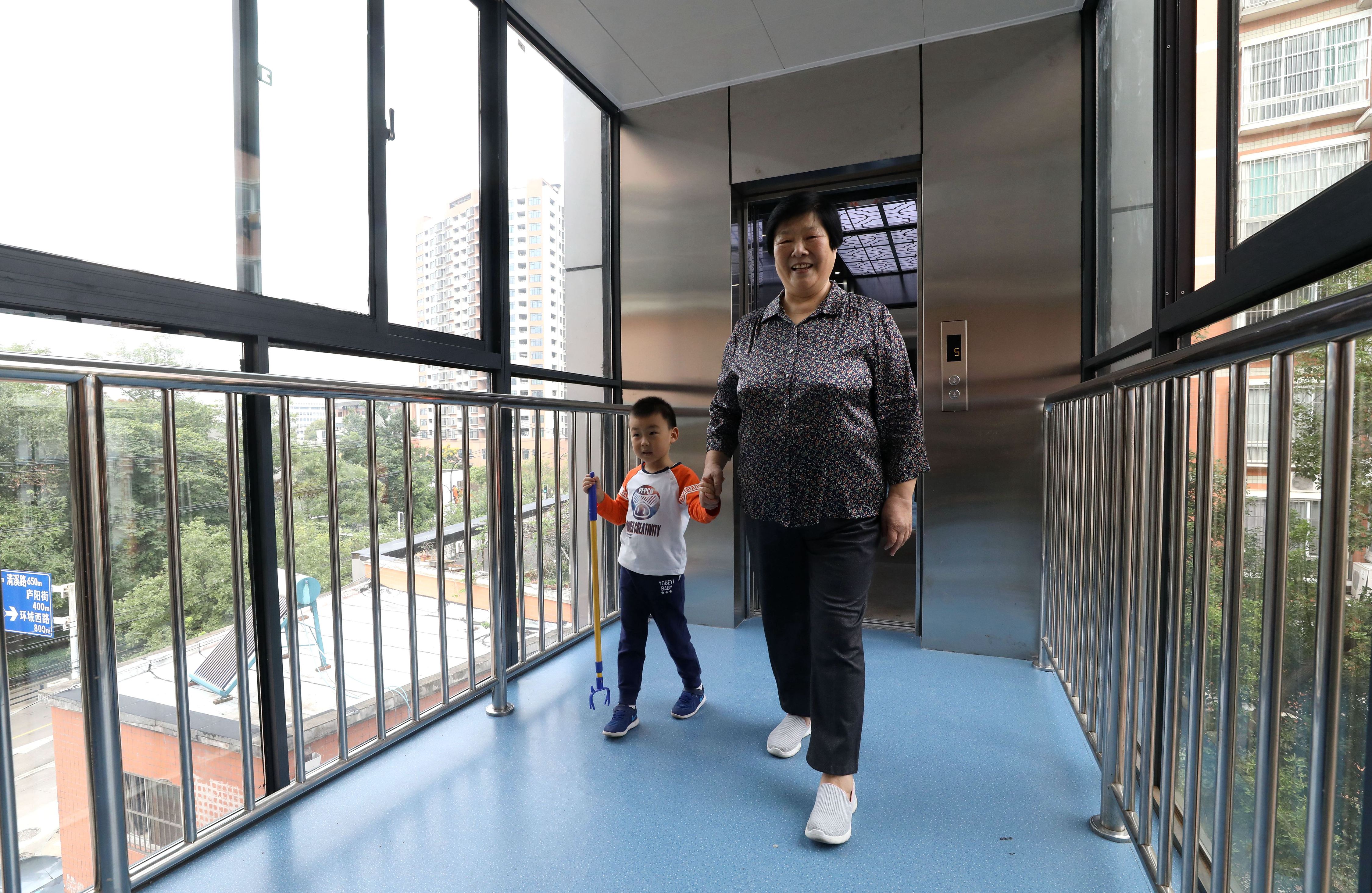01:01

For 90-year-old Wang Caiying, moving around her home in Beijing, became challenging after she tripped over a tall step entering the bathroom several years ago. Her husband, 85, enlisted the help of government workers to make the house more senior-friendly this spring.
After analyzing Wang's movement paths at home, they installed several grab bars and handrails beside the dining table, the bed and the toilet to help her maintain balance. They also transformed the step of the bathroom into a gentle slope.
To their surprise, the couple spent 800 yuan (about $120) only for the entire revamp because the city foots most of the bill for residents over 90.
Due to falling birth rates and rising life expectancy, China has become a country with a fast-aging population.
More than 264 million Chinese are over 60, accounting for 18.7 percent of the population, according to the 2021 national population census. The number of people over 65 reached 190 million at a lower rate of 13.5 percent.
"About 90 percent of the elderly in China take care of themselves at home, seven percent rely on community support and three percent live in nursing homes," Wang Haidong, director of the department of aging and health of the National Health Commission, told a press conference in April.
However, home can be dangerous for the elderly as it is where they fall and get injured most frequently. In China, falls are the leading cause of injury-related death for those 65 and older, more and more of whom require senior-friendly living spaces.
"The physical condition of the elderly is worse than before, and we need to prevent accidents through customized designs so that they can see clearly, hear clearly, and don't fall easily," said Professor Zhou Yanmin of the School of Architecture at Tsinghua University.

Wang Jinhua, 65, and her grandson exit the newly installed elevator in Mingzhuyuan, Shushan District of Hefei City, east China's Anhui Province, September 25, 2020. /CFP
Wang Jinhua, 65, and her grandson exit the newly installed elevator in Mingzhuyuan, Shushan District of Hefei City, east China's Anhui Province, September 25, 2020. /CFP
General instructions on senior-friendly renovations were included in the updated version of the law on protecting the rights and interests of the elderly ten years ago. Under the law, "the elderly" refers to citizens 60 and above. The guidance says that all levels of government should promote the design and construction of elderly-friendly communities and the renovation of barrier-free facilities in seniors' homes.
In 2019, the government urged more departments to speed up building a senior-friendly living environment. It later issued a specific plan for implementing home renovation projects for the elderly. More cities have rolled out similar policies since.
Shanghai, one of the pioneering age-friendly cities, began revamping homes for seniors in 2012. Over 8,000 economically disadvantaged families benefited from the initiative up to 2019. Last year, the program was expanded to all elderly residents, with priority given to those who are childless, disabled or live alone.
Suzhou, in east China's Jiangsu Province, recently announced that it would renovate 10,000 homes of the elderly this year and provide corresponding subsidies of up to 3,000 yuan per household.
Despite rising demand, the market for age-friendly housing is still in its infancy.
"It is estimated that the potential output value of the renovation industry for the elderly in China is about 3.25 trillion yuan," said Li Zhihong, director of the policy research department of the China National Committee on Aging.
Li pointed out that there is still a lack of national standards in senior-friendly adaptation. As standards vary, the quality of products and services may differ.

A volunteer helps a senior use a smartphone after a public class on smartphone skills in Wangyuan Village, Dagong Town, Nantong City, east China's Jiangsu Province, April 8, 2022. /CFP
A volunteer helps a senior use a smartphone after a public class on smartphone skills in Wangyuan Village, Dagong Town, Nantong City, east China's Jiangsu Province, April 8, 2022. /CFP
The quest to make the country more friendly to seniors is not limited to the physical world, but extends to the digital front.
"It's hard to learn how to use a smartphone because I can't read," said 70-year-old Li Qinfang, who comes from north China's Shanxi Province and is currently helping to look after her grandson in Beijing. "My son taught me how to use a smartphone several times, but I forgot the complicated steps very quickly. Now I use a mobile phone designed for seniors."
Li is far from the only senior citizen who has found it hard adapting to the increasingly digitized world in China.
The number of netizens in China reached one billion by December 2021, according to data from China Internet Network Information Center. One in 10 is aged 60 and above.
The center's report also shows that the people not using the internet don't know how to use digital devices due to a lack of skills or limited education. In addition to preserving access to traditional offline services, some companies are working to simplify the way the elderly use online services.
At the beginning of last year, 115 websites and 43 mobile applications were required to undergo modification to cater to the needs of the elderly. Most of these websites and apps provide basic services such as news, messaging, shopping and financial services.
WeChat, a social communication app with the largest userbase in China, added an "easy mode" function last September. Fonts are larger with sharper colors and users can tap and hear text messages after enabling the function.
Personal privacy and financial security are the biggest concerns of the middle-aged and elderly when using apps on their smartphone, according to a survey by consulting agency iiMedia Research in 2021. Over 70 percent fear they might be charged without their knowledge while using apps.
Young volunteers, mainly community workers and college students, play a leading role in empowering seniors to use digital devices. They not only teach the elderly how to download and use apps but also tell them how to avoid cyber deception or fraud. Training sessions or classes on smartphone skills are especially welcome in aging communities.
Online, young people have joined the discussion of meeting the needs of the silver-haired. In January 2021, a 21-year-old college student created a discussion thread focusing on promoting senior-friendly improvements on a forum-like social media platform Douban. More than 26,000 users have joined the discussion group, most of whom are in their 20s and 30s.
Some share apps suitable for the elderly, and others offer general guidance in navigating the new technologies.
"We all get old," the founder wrote in the group introduction. "We should build a world where older people can live safely and happily."
(Li Qinfang is a pseudonym.)
Video edited by Yang Yiren

